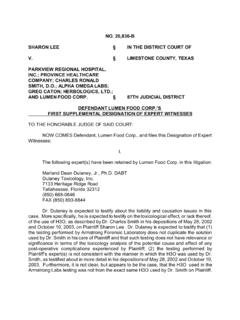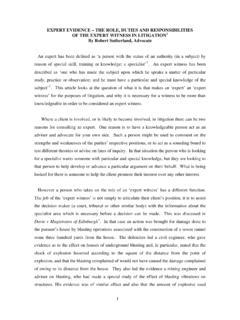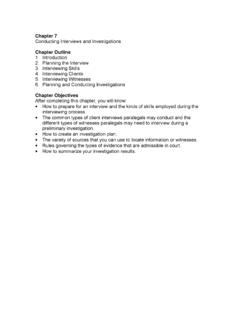Transcription of THE TIMING OF EXPERT DISCLOSURE UNDER …
1 1 DEFENSE ASSOCIATION OF NEW YORKTHE TIMING OF EXPERT DISCLOSURE UNDERCPLR 3101(d)Presented by:The Honorable Ellen M. Spodek: Justice of The Supreme Court Kings CountyClaire F. Rush, & Sabbatino, PLLC33 Whitehall Street- 16 FloorthNew York, New York 10004(212) 600-2454 Claire F. Rush is a founding partner of Rush & Sabbatino, PLLC., New York, TIMING OF EXPERT DISCLOSURE UNDER CPLR 3101(d)By: Claire F. Rush 1 The TIMING of CPLR 3101(d) EXPERT DISCLOSURE is an area fraught with dangers andpitfalls. These traps have been magnified by recent decisions from the Second Department thatimpose a time frame on when CPLR 3101(d) disclosures must be made when making a motionfor summary judgment. This program will explore the statutory requirements for expertdisclosure in New York, the current state of the law and a proposed amendment to the CPLR meant to remediate the unsettled state of this law.
2 THE STATUTORY FRAMEWORKCPLR 3101(d) provides in relevant part as follows: (d) Trial preparation. 1. Experts. (i) Upon request, each party shall identify each person whomthe party expects to call as an EXPERT witness at trial and shall disclose in reasonable detail thesubject matter on which each EXPERT is expected to testify, the substance of the facts and opinionson which each EXPERT is expected to testify, the qualifications of each EXPERT witness and asummary of the grounds for each EXPERT 's opinion. However, where a party for good cause shownretains an EXPERT an insufficient period of time before the commencement of trial to giveappropriate notice thereof, the party shall not thereupon be precluded from introducing theexpert's testimony at the trial solely on grounds of noncompliance with this paragraph.
3 In thatinstance, upon motion of any party, made before or at trial, or on its own initiative, the court maymake whatever order may be just. In an action for medical, dental or podiatric malpractice, aparty, in responding to a request, may omit the names of medical, dental or podiatric experts butshall be required to disclose all other information concerning such experts otherwise required bythis paragraph. CPLR 3101 (d) APPLIES ONLY TO EXPERT WITNESSES CPLR 3101 (d) does not apply to fact witnesses. Medical providers called simply torecite a history should accordingly not require a 3101(d) WITNESS INFORMATION MUST BE REQUESTED If a party fails to serve a Demand for EXPERT Witness DISCLOSURE prior to the filing of theNote of Issue and Certificate of Readiness, EXPERT DISCLOSURE will be deemed waived absent ashowing of special or unusual circumstances.
4 See, Aversa v. Taubes, 194 580 (2d ); 22 NYCRR 202. INFORMATION THAT MUST BE DISCLOSED A party responding to a demand for EXPERT witness information shall disclose: a) qualifications of the EXPERT witness;b) the subject matter on which the EXPERT is expected to testify;c) a summary of the grounds for each EXPERT 's opinion, and, d) substance of the facts and opinions on which the EXPERT is expected to testify. Note that in medical malpractice cases the identity of a party s EXPERT need not bedisclosed. See, CPLR 3101 (d)(1)(i). DISCLOSURE MUST SET FORTH BASIS OF EXPERT S OPINIONAn EXPERT 's testimony may rest on a variety of data including: 1. Evidence in the record; 2. Facts personally known to the EXPERT ;3.
5 Professional reliable materials, or 4. Other information derived from a witness subject to cross examination at trial. See, People v. Stone, 35 69 (1974), People v. Sugden, 35 453 (1974). Hambschv. , 63 723 (1984), Wagman v. Bradshaw, 292 84 (2d Dept. 2002). CPLR 3101(d) DOES NOT MANDATE DISCLOSURE OF AN EXPERT 'S REPORTThe best practice with respect to exchange of EXPERT information is not to exchange anexpert s reports. Nothing in the CPLR or the court rules mandates the exchange of a non medical EXPERT s AND DISCLOSURE OF MEDICAL REPORTSS pecial rules apply to the exchange of medical reports in personal injury and wrongfuldeath actions. Pursuant to 22 , a plaintiff must provide copies of all medicalreports or duly executed and acknowledged written authorizations permitting the defendants toobtain copies of these records.
6 Defense counsel in turn is required to serve copies of theirexpert s reports within forty-five (45) days of completion of the defendant's examinations. Pursuant to 22 NYCRR (h), the remedy for failure to comply with this Court rule ispreclusion. This rule goes on to state that no party shall be permitted to offer any evidence ofinjuries or conditions not set forth or put in issue in the respective medical reports previously4exchanged. Courts uniformly preclude the testimony of any treating or examining EXPERT whosereports have not been served as provided for by this rule. See generally, Swezey v. MontagueRehab and Pain Managment, 84 779 (2d Dept. 2011) (The Second Department affirmeda trial court Order precluding the plaintiff's treating physician from testifying at trial becauseplaintiff failed to serve the doctor's medical report and did not demonstrate good cause for theadmission of his testimony).
7 PARTIES ARE BOUND BY THEIR EXPERT S REPORTS In Matszewska v. Golubeya, 293 580 (2d Dept. 2002), the Appellate Divisionheld that a trial court properly precluded the testimony of the defense s medical EXPERT , where theexpert sought to repudiate the conclusion expressed in his report that the plaintiff's pre-existingarthritis was not related to and would not have any effect on her recovery. At trial four monthslater, defense counsel claimed that this was an error and sought to elicit testimony that theplaintiff's pre-existing arthritis would effect her recovery. Because this contradictory testimonysurprised and would have prejudiced the plaintiff, Supreme Court properly excluded thetestimony. The Appellate Division noted that the defendant failed to demonstrate good cause ofits admission.
8 The moral to this story is simple: REVIEW THE REPORTS BEFORE YOUEXCHANGE 3101(d) DISCLOSURE IS NOT REQUIRED FOR A TREATING PHYSICIANA treating physician can testify despite the failure of plaintiff s counsel to serve a CPLR 3101(d) notice. Both the First and Second Departments have held that when a plaintiff'sintended EXPERT medical witness is a treating physician whose records and reports have been fullydisclosed, a failure to serve notice that the physician will testify does not warrant preclusion ofthat EXPERT 's testimony since the defendant has sufficient notice of the proposed testimony tonegate any claim of surprise or prejudice. See, Overeem v. Neuhoff, 254 398 (2d ); McGee v. Family Care Services, 246 308 (1st Dept.)
9 1998). The failure to serve a 3101(d) with respect to a treating physician's opinion on causationwill not preclude a plaintiff from offering his treating doctor s EXPERT opinion on the issues ofproximate cause. See, Logan v. Roman, 58 810 (2d Dept. 2009); Ryan v. City of NewYork, 269 170 (1st Dept. 2000). Neither CPLR 3101(d) nor 22 justify the exclusion of testimony of aplaintiff's treating physician as to permanency of plaintiff's injuries. See, Hughes v. Webb, 1035 (2d Dept. 2007); Langhorne v. County of Nassau, 40 1045 (2d Dept. 2007). Time requirements may however be imposed by Preliminary Conference Orders2or Court Rules. 5 QUESTION Is a party who subpoenas and offers the testimony of an adverse EXPERT witness pursuantto Gilly v.
10 City of New York, 69 509 (1987), required to serve a 3101(d)?WHEN SHARING PHYSICALS DEFENDANTS MUST SERVE 3101(d) RESPONSESIn Taveras v. Amir, 57 887 (2d Dept. 2008), the Appellate Division held that atrial court did not improvidently preclude the testimony of two EXPERT witnesses who had beenretained by settling defendants. The attorneys for the non settling defendant in Taveras did notdisclose that they intended to call these experts as their EXPERT witnesses until after the damagestrial was already underway. Judge Schack found prejudice to the plaintiff and the AppellateDivision agreed. EXPERT WITNESSES WILL NOT BE PRECLUDED MERELY BECAUSE OF NONTIMELY DISCLOSURECPLR 3101(d) does not require a party to respond to a demand for EXPERT witnessinformation at any specific time.







